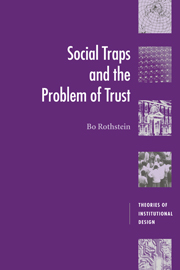Book contents
- Frontmatter
- Contents
- List of tables and figures
- Acknowledgements
- 1 Reflections after a long day in Moscow
- 2 On the rational choice of culture
- 3 On the theory and practice of social capital
- 4 Social capital in the social democratic welfare state
- 5 How is social capital produced?
- 6 The problem of institutional credibility
- 7 Trust and collective memories
- 8 The transition from mistrust to trust
- 9 The conditions of trust and the capacity for dialog
- Bibliography
- Index
1 - Reflections after a long day in Moscow
Published online by Cambridge University Press: 22 September 2009
- Frontmatter
- Contents
- List of tables and figures
- Acknowledgements
- 1 Reflections after a long day in Moscow
- 2 On the rational choice of culture
- 3 On the theory and practice of social capital
- 4 Social capital in the social democratic welfare state
- 5 How is social capital produced?
- 6 The problem of institutional credibility
- 7 Trust and collective memories
- 8 The transition from mistrust to trust
- 9 The conditions of trust and the capacity for dialog
- Bibliography
- Index
Summary
All intellectual journeys have a particular beginning. This one commenced one evening after a long day in Moscow five years ago. In November 1997, I was invited by the Swedish Ministry for Foreign Affairs to speak at the Swedish Embassy in the Russian capital. President Boris Yeltsin was soon to make his first (and only) state visit to Sweden and his entourage of civil servants and politicians was eager for more information about Swedish society. There were many issues upon which they sought enlightenment, according to the Foreign Affairs official who contacted me, and what they wanted from me was a lecture that addressed how the Swedish welfare state worked and how we “controlled the Swedish state.” It sounded intriguing, and I accepted the invitation with alacrity. I should add that I had no real personal experience of Russia, and my contacts with the extensive Swedish and international research community concentrated on Eastern Europe were even more limited then than they are now.
The lecture, which was interpreted to Russian, was sadly of a somewhat more mundane sort. Much of it dealt with the sometimes esoteric differences between universal and selective welfare programs, the right of Swedish citizens to occasionally appeal the decisions of government agencies, the mysteries of the principle of public access to official records, and peculiar institutions like the Parliamentary Ombudsman.
- Type
- Chapter
- Information
- Social Traps and the Problem of Trust , pp. 1 - 27Publisher: Cambridge University PressPrint publication year: 2005



